I'm trying to log into a rest api using the below code and though fiddler can decode the response, it's not being decoded by the WebClient. I am using a class that extends WebClient which I found on SO that allows me to access the response. It is also below.
using (WebClientWithResponse client = new WebClientWithResponse())
{
client.Headers.Add("cache-control", "no-cache");
client.Headers.Add("Content-Type", "application/x-www-form-urlencoded");
client.Headers.Add("Authorization", basicAuth);
client.Headers.Add("Accept", "application/json, text/json, text/x-json, text/javascript, application/xml, text/xml");
client.Headers.Add("User-Agent", "MyAppName/21.1.1");
client.Headers.Add("Host", "login.company.com");
client.Headers.Add("Accept-Encoding", "gzip, deflate");
using (StreamWriter sw = new StreamWriter(client.OpenWrite("https://login.companyapi.com/services/oauth2/token", "POST")))
{
sw.Write(loginContent);
}
//string response = Encoding.UTF8.GetString(client.Response);
string response = Encoding.UTF8.GetString(Decompress(client.Response));
File.WriteAllText(".\\response.txt", response);
Console.WriteLine(response);
}
public class WebClientWithResponse : WebClient
{
// we will store the response here. We could store it elsewhere if needed.
// This presumes the response is not a huge array...
public byte[] Response { get; private set; }
protected override WebResponse GetWebResponse(WebRequest request)
{
var response = base.GetWebResponse(request);
var httpResponse = response as HttpWebResponse;
if (httpResponse != null)
{
using (var stream = httpResponse.GetResponseStream())
{
using (var ms = new MemoryStream())
{
stream.CopyTo(ms);
Response = ms.ToArray();
}
}
}
return response;
}
}
So below you can see what Fiddler shows (after I click the decode button) and what I receive in my app.
This is how Notepad++ looks when loading the saved response file.
� ]�Ks�@�K8�
!@Ъ�>P@M�B��H@��ݕ�����C�9~��3��JA�T�0��!�+����{�gȟu��^r����1��(YtU+���H��4JWs��";d�E�[]�4��������9o�,� �G�Ǘ@��뺧=j��0 �IT��Jd�0E](R���.Ir����͒�V</؝�(2�Jߏ��!�1��q�S=U�4� �턔'�R����"ײmϱ��,rF�I���T�Lp����t�لM�3�:��(�[g�:�x��}}*��p
I've never had this issue before and can't for the life of me figure out why.
EDIT: Adding the response headers as requested by Marc Gravell
HTTP/1.1 200 OK
Date: Fri, 16 Apr 2021 19:33:23 GMT
Strict-Transport-Security: max-age=31536000; includeSubDomains
X-Content-Type-Options: nosniff
X-XSS-Protection: 1; mode=block
Cache-Control: no-cache,must-revalidate,max-age=0,no-store,private
Set-Cookie: BrowserId=m6jRGp7qEeuWJ50fQL0HHA; domain=.company.com; path=/; expires=Sat, 16-Apr-2022 19:33:23 GMT; Max-Age=31536000
Expires: Thu, 01 Jan 1970 00:00:00 GMT
X-ReadOnlyMode: false
Content-Type: application/json;charset=UTF-8
Vary: Accept-Encoding
Content-Length: 368
EDIT2: Marc Gravell gave me the idea that it wasn't decompressed. That turned out to be correct. I added this function found here to decompress the response.
public static byte[] Decompress(byte[] data)
{
using (var compressedStream = new MemoryStream(data))
using (var zipStream = new GZipStream(compressedStream, CompressionMode.Decompress))
using (var resultStream = new MemoryStream())
{
zipStream.CopyTo(resultStream);
return resultStream.ToArray();
}
}

